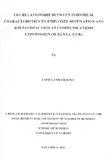| dc.description.abstract | Employees acting towards company goals and having a strong desire to remain in the organization are very important for the success of the organization. In order to generate such organizational commitment of the employees, the knowledge about what motivates and satisfies them is essential. The purpose of this study was to determine the relationship between individuals' characteristics to employee motivation and subsequently job satisfaction. The literature review explored what has been advanced on individuals' characteristics, motivation and job satisfaction. The review proceeded to examine models of job satisfaction, what influences job satisfaction and outcomes of job satisfaction. A further review was done on the role of motivation, intrinsic and extrinsic motivators and the various theories advanced on motivation. The review also looked at the physiological dimension of human motives and the socialization process of individuals.
The methodology employed was descriptive research design taking the format of a survey. The population of study consisted of all the employees of CCK from which a sample of 53 was selected. The sampling method used was stratified random sampling. The research instrument was questionnaires which were distributed to sampled CCK employees and used to collect primary data. The response was obtained from 45 employees. Descriptive statistics was used during the analysis to compute frequencies, percentages and means. In addition parametric test was used for regression analysis to establish the relationship between the variables and make inferences. The findings indicated that there is a relationship between individual characteristics, motivation and job satisfaction to varying extents with some characteristics such as age, job group, education, personality, professional affiliation and work experience having higher influence. Marital status and religion have moderate influence and gender has very minimal influence on motivation and job satisfaction.
The findings also indicated that employees at CCK rated the following job factors as being important in a work situation and also being important in influencing an individual's level of job satisfaction; Environment, Task Significance, Task Identity, Skills, Monetary Compensation, Job Security, Autonomy, Feedback and Non-monetary Compensation in the stated order. Finally, the study recommended that employers should consider analyzing their employees further with regard to their characteristics when designing their motivational plans in order to align their plan to employees' characteristics if they are to achieve their desired goal of attracting and retaining a motivated and satisfied workforce. Employees' work situation should also be looked at in more detail with a view to re-designing the work so as to provide employees to a higher extent with intrinsic motivators such as feedback, skills, task significance and task identity. The study also recommends that environmentai aspect be considered as they are of motivational importance for all employees. | en_US |

